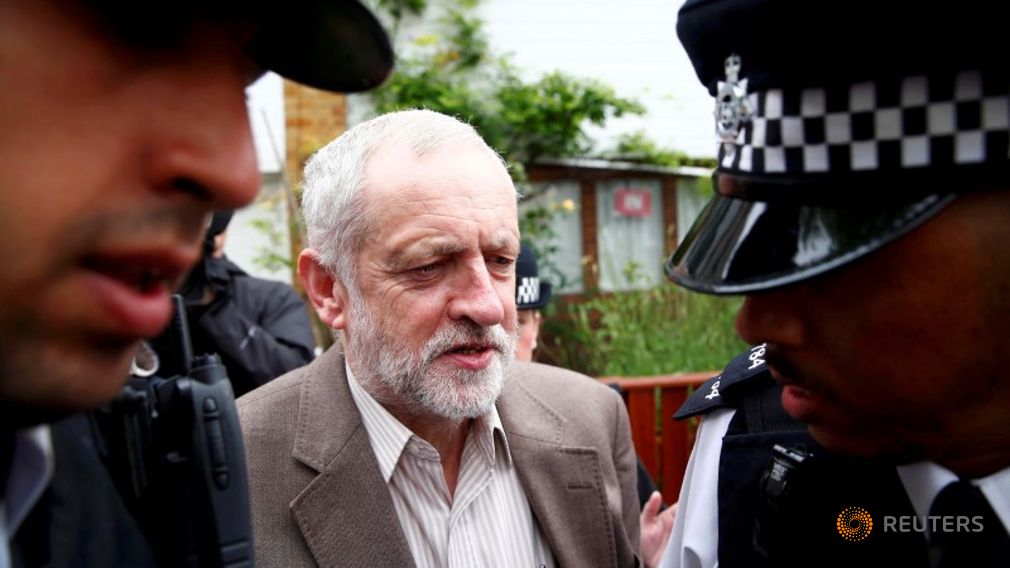UK's Labour leader defies Brexit ouster vote
 |
| The leader of Britain's opposition Labour party, Jeremy Corbyn, leaves his home in London, Britain June 27, 2016. Photo source REUTERS/Neil Hall |
Corbyn, who has the crucial backing of labour unions and was elected last year in a landslide by ordinary Labour party members, was defeated by 172 to 40 of the 229 Labour lawmakers in the non-binding vote.
But the 67-year-old self-declared pacifist, who won the Labour leadership despite warnings that he would take the party backwards and was unelectable, insisted he would not stand down.
"I was democratically elected leader of our party for a new kind of politics by 60 per cent of Labour members and supporters, and I will not betray them by resigning. Today's vote by MPs has no constitutional legitimacy," he said in a statement.
'NO CONSTITUTIONAL LEGITIMACY'
"Today's vote by MPs has no constitutional legitimacy," he added.
Five days after Britain's shock referendum vote, the two parties that have dominated Westminster for nearly a century - Labour and Prime Minister David Cameron's Conservatives - are in almost complete disarray.
Cameron announced his resignation last Friday, hours after the historic EU referendum vote handed victory to the Leave campaign by 52 per cent to 48 for Remain.
Corbyn, who has long had a strained relationship with Labour's MPs, almost immediately came under pressure to quit because of his lacklustre role in promoting the Remain camp, which Labour officially campaigned for.
A seemingly endless string of his front bench team then quit in coordinated fashion, each releasing withering resignation letters, and on Friday two of them proposed the no-confidence motion which was voted upon Tuesday.
If Corbyn continues to defy calls to resign, the next obvious step is for him to face a leadership challenge.
Media reports ON Tuesday suggested that his former business spokeswoman Angela Eagle could be preparing to launch a bid to succeed Corbyn.
The Labour turmoil comes amid speculation that, whoever succeeds Cameron as Conservative leader and prime minister, may be tempted to call an early election later this year.
'TROTSKYIST FANTASY'
Former Foreign Secretary Jack Straw said his party faced an "apocalypse" if an election was held and Corbyn was still in office. "It's probably the worst crisis since Labour's formation," he told Sky News.
"Mr Corbyn's position is wholly untenable. This I'm afraid is a very old Trotskyist fantasy, that somehow or other he'll be able to bypass parliament."
Meanwhile, the starting gun on the Tory leadership race is set to be fired this week as nominations open on Wednesday to succeed Cameron. They will close at noon on Thursday, and the new leader is expected to be announced on Sep 9.
Former London mayor and "Leave" figurehead Boris Johnson is tipped as the frontrunner along with Home Secretary Theresa May.
On Tuesday pro-EU finance minister George Osborne, long seen as a possible Cameron successor, ruled himself out saying: "I am not the person to provide the unity my party needs at this time."
British media reported that Work and Pensions Minister Stephen Crabb, a virtual unknown to the British public, will put his name forward.
A new poll Tuesday put May in the lead with 31 per cent, against 24 per cent for Johnson.
If more than two candidates stand, Tory MPs will vote next week to whittle down the field to two nominees, before the new leader is chosen by a postal ballot of party members, who currently number around 150,000.
Critics have questioned whether the "Leave" camp - and Johnson in particular - has any idea how to manage the unprecedented situation left by last week's vote.
"He has still to offer anything like a concrete plan on how he would negotiate the post-Brexit future," wrote former BBC political editor Nick Robinson.
He added: "The fallout from the biggest exercise in popular democracy has already been dramatic ... It has, though, only just begun.
What the stars mean:
★ Poor ★ ★ Promising ★★★ Good ★★★★ Very good ★★★★★ Exceptional
Latest News
More News
- ASEAN states unite for future economic stability (March 06, 2025 | 10:41)
- Indonesia plans over 20 energy projects in 2025 (March 05, 2025 | 10:09)
- Bali to use “water taxi” to address traffic congestion (March 04, 2025 | 17:15)
- RoK, Thailand hold 4th round of economic partnership negotiations (March 04, 2025 | 16:48)
- Thailand busts illegal e-money firms (March 03, 2025 | 16:47)
- Thailand to repatriate thousands of scam centre workers from Myanmar (March 03, 2025 | 10:51)
- PM stresses need for ASEAN to embrace new technologies (February 26, 2025 | 17:30)
- The world's future belongs to the youth: PM (February 26, 2025 | 17:23)
- More than 200 foreigners rescued from Cambodian scam centre (February 25, 2025 | 16:06)
- New Zealand PM’s visit to tighten bonds with Vietnam: Ambassador (February 24, 2025 | 11:22)




















 Mobile Version
Mobile Version